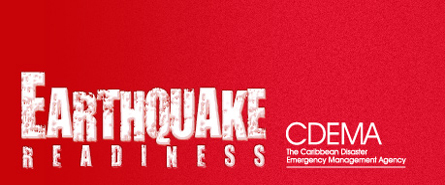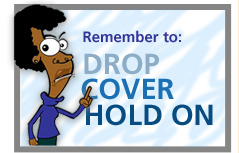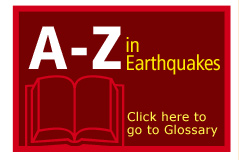: strtotime(): It is not safe to rely on the system's timezone settings. You are *required* to use the date.timezone setting or the date_default_timezone_set() function. In case you used any of those methods and you are still getting this warning, you most likely misspelled the timezone identifier. We selected the timezone 'UTC' for now, but please set date.timezone to select your timezone. in
: date(): It is not safe to rely on the system's timezone settings. You are *required* to use the date.timezone setting or the date_default_timezone_set() function. In case you used any of those methods and you are still getting this warning, you most likely misspelled the timezone identifier. We selected the timezone 'UTC' for now, but please set date.timezone to select your timezone. in
|

Dos:
- Check for fires
- Check Utilities - shut off if necessary
- Check your house for serious damage - evacuate if there's threat of collapse
- Check for injuries - administer First Aid
- Be prepared for more earthquake tremors or aftershocks
- Turn on a transistor radio for emergency bulletins.
- Stay away from landslide-prone areas.
- Stay away from buildings that may have been damaged or weakened by the earthquake
- Keep the streets clear for the passage of emergency and rescue vehicles.
- Clear up hazardous materials
- Cooperate fully with public safety officials.
- Assist others
Don'ts:
- Don't light a match or turn on a light switch. Use a flashlight!
- Never touch fallen power lines
- Don't go to the beach to watch for giant sea waves
- Don't go sightseeing! Keep the streets clear for the passage of emergency and rescue vehicles
- Don't attempt to move seriously injured persons unless they are in danger of further injury
- Don't use your telephone, except for a medical or fire emergency.
- Don't expect firefighters, police, army or other emergency personnel to help you. They may not be available.
- PARENTS: Don’t phone your child's school, they may be trying to reach you or emergency response services. When safe to travel, go to the school to collect your child or contact the designated guardian to collect your child as your child will NOT be released otherwise.
back to top
- Remain calm
- Assess the situation
- Determine a course of action
- Stay in your safe place, and count to 60. When you move from your safe place, move cautiously, looking up and around for potential hazards.
- Check yourself and those around you for injuries.
- If you live near coastal waters, be aware that the earthquake may have caused a tsunami. Evacuate to higher ground immediately and stay there until you are told it is safe to return.
- If the electricity is out, use battery-powered flashlights or lanterns. Do not use candles, matches, or open flames indoors because of the possibility of gas leaks. Likewise, flashlights should be intrinsically safe (sparkless).
- If you smell gas or hear a hissing or blowing sound, open a window and leave the building immediately and call the gas company. If possible, shut off the main gas valve outside.
- If there is electrical damage, switch off the power at the main control panel.
- If water pipes are damaged, shut off the water supply at the main valve.
- Wear sturdy shoes in areas covered with fallen debris and broken glass.
- Check your home for structural damage.
- Clean up spilled medicines, bleaches, gasoline, and other flammable liquids.
- Do not flush toilets until you know that sewage lines have not been damaged.
- Open cabinets cautiously. Beware of objects that can fall off shelves.
- Use the phone (including cell phones) only to report a life-threatening emergency. Hang up phones that were shaken off their hooks to keep the lines clear.
- Listen to news reports for the latest emergency information.
- Stay away from damaged areas, unless the relevant authorities have specifically requested your assistance.
- Earthquakes are usually followed by smaller tremors, or aftershocks. Be prepared for these.
If you are trapped under debris:
- Do not move about or kick up dust.
- Cover your mouth with a handkerchief or clothing.
- Tap on a pipe or wall so rescuers can locate you. Use a whistle if one is available. Shout only as a last resort - shouting can cause you to inhale dangerous amounts of dust.
back to top
|














